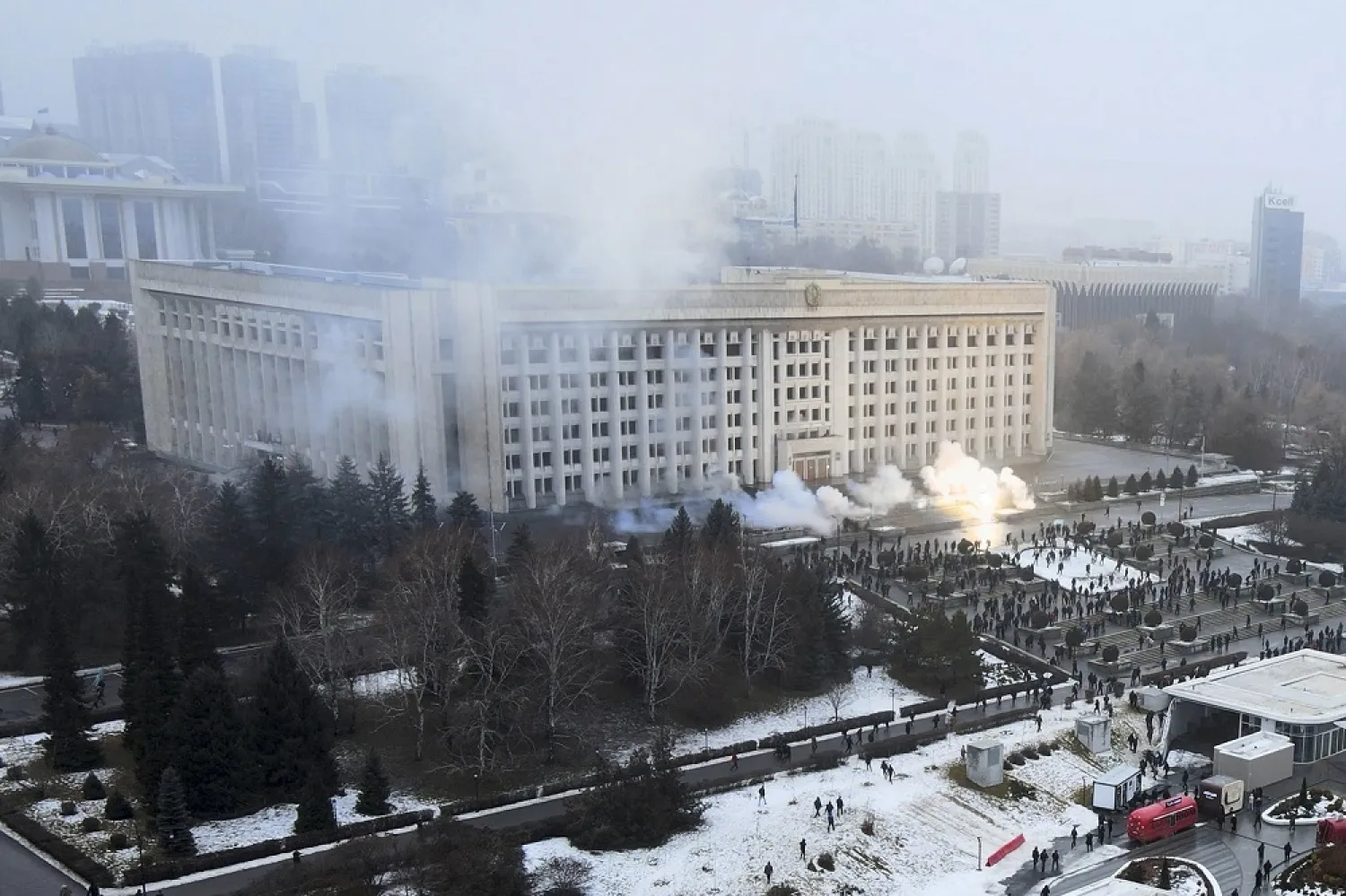Fresh violence erupted in Kazakhstan's main city on Thursday after Russia rushed in paratroopers overnight to put down a countrywide uprising in one of Moscow's closest former Soviet allies.
Police in the main city Almaty said they had killed dozens of rioters overnight. The authorities said at least 18 members of the security forces had died, including two found decapitated. More than 2,000 people had been arrested.
After a night of running confrontations between protesters and troops on the streets, a presidential residence in the city and its mayor's office were both ablaze, and burnt out cars littered the city, Reuters journalists said.
Military personnel regained control of the main airport, seized earlier by protesters. Thursday evening saw renewed battles in Almaty's main square, occupied alternately by troops and hundreds of protesters throughout much of the day.
The Russian deployment was a gamble by the Kremlin that rapid military force could secure its interests in the oil and uranium-producing Central Asian nation, by swiftly putting down the worst violence in Kazakhstan's 30 years of independence.
Reuters reporters heard explosions and gunfire as military vehicles and scores of soldiers advanced, although the shooting stopped again after nightfall. TASS news agency quoted witnesses as saying people had been killed and wounded in the new gunfire.
Oil production at Kazakhstan's top field Tengiz was reduced on Thursday, its operator Chevron said, as some contractors disrupted train lines in support of the protests.
The internet was shut down across the country, making it impossible to gauge the extent of the unrest. But the violence was unprecedented in a state ruled firmly since Soviet times by leader Nursultan Nazarbayev, 81, who held on to the reins despite stepping down three years ago as president.
'Attack on our citizens'
Nazarbayev's hand-picked successor, President Kassym-Jomart Tokayev, called in the Russian forces overnight as part of a Moscow-led military alliance of ex-Soviet states. He blamed the unrest on foreign-trained terrorists who he said had seized buildings and weapons.
"It is an undermining of the integrity of the state and most importantly it is an attack on our citizens who are asking me... to help them urgently," he said.
Moscow said it would consult with Kazakhstan and allies on steps to support the Kazakh "counter-terrorist operation" and repeated Tokayev's assertion that the uprising was foreign-inspired. Neither Kazakhstan nor Russia provided evidence to support that.
Moscow did not disclose how many troops it was sending or what role they were playing, and it was not possible to determine the extent to which Russians may have been involved in Thursday's unrest.
The uprising, which began as protests against a New Year's Day fuel price hike, swelled on Wednesday, when protesters chanting slogans against Nazarbayev stormed and torched public buildings in Almaty and other cities.
Tokayev initially responded by dismissing his cabinet, reversing the fuel price rise and distancing himself from his predecessor, including by taking over a powerful security post Nazarbayev had retained. But those moves failed to mollify crowds who accuse Nazarbayev's family and allies of amassing vast wealth while the nation of 19 million remained poor.
Nazarbayev stepped aside from the presidency in 2019 as the last Soviet-era Communist Party boss still ruling a former Soviet state. But he and his family kept posts overseeing security forces and the political apparatus in Nur-Sultan, the purpose-built capital bearing his name. He has not been seen or heard from since the unrest began.
'Looters came in'
The swift arrival of Russian troops demonstrated the Kremlin's willingness to safeguard its influence in the ex-Soviet Union with force. Since late 2020, Moscow has shored up the leader of Belarus against a popular uprising, intervened to halt a war between Azerbaijan and Armenia, and, to the West's alarm, massed troops again near Ukraine, which Russia invaded eight years ago.
Deployment in Kazakhstan carries risk: by exposing the Kazakh authorities as dependent on Russian muscle, Moscow could further inflame the protesters.
"They are Kazakhs and Tokayev will try putting them down with Russian troops. That will not look great for Moscow," tweeted economist Tim Ash, who specializes in the region.
But it is difficult to say how broad support might be for protests in a country with little organized opposition, especially if demonstrators are blamed for violence.
"Thank God, the military has arrived, finally," Ali, a manager at Holiday Inn hotel near Almaty's main square, told Reuters by phone. "Looters came in last night, smashing car windows near us."
The West has so far mainly limited its response to calls for calm. US Secretary of State Antony Blinken spoke to his Kazakh counterpart "and advocated for a peaceful, rights-respecting resolution to the crisis", spokesperson Ned Price said.
EU top diplomat Josep Borrell said Russia's military intervention brought "memories of situations to be avoided".
Kazakhstan's long-dated dollar-denominated sovereign bonds have plunged, losing around 7 cents since the start of the week.
Kazakhstan is the top global producer of uranium, which jumped in price by 8% after the unrest.
The country is also the world's second-largest miner of bitcoin. Bitcoin's "hashrate" - the computing power of machines in its network - dropped by over 10% on Wednesday after Kazakhstan's internet was shut off, according to crypto mining firm BTC.com.









